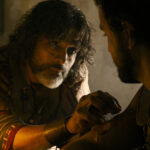“We are all hostiles.” That’s the tagline for Hostiles, the new western starring Christian Bale and directed by Scott Cooper (Crazy Heart, Black Mass).
It’s an appropriate tagline for a film where no hero is untainted by villainy and the “for all have sinned” reality of total depravity is painfully clear. Indeed, the film’s D. H. Lawrence epigraph (“The essential American soul is hard, isolate, stoic, and a killer. It has never yet melted.”) underscores the point, even if its implications go beyond just America.
All humans are depraved, wayward, helpless in sin. And yet there is hope:
And you, who once were alienated and hostile in mind, doing evil deeds, he has now reconciled in his body of flesh by his death, in order to present you holy and blameless and above reproach before him. (Col. 1:21–22)
All who were once hostiles have hope, because of Christ, of being presented “holy and blameless.” Though Hostiles doesn’t spell out this gospel arc explicitly, it’s a film with a distinctly Christian grasp of universal culpability and reconciling grace.
God’s Presence (and Absence) in the Western Genre
The western genre has long been conducive to vivid explorations of fallen humanity and questions of God’s presence or absence (current Netflix hit Godless nods to this in its very name). The barren landscapes and lawless savagery of the West (think survival-of-the-fittest narratives like The Revenant) make these questions more urgent, perhaps, as the gradations of good and evil are more vivid within such extreme environments.
Sometimes these explorations are strongly theological in reflecting on redemption or damnation (e.g., Unforgiven or True Grit). Other times they are more bleak and nihilistic (e.g., No Country for Old Men or The Hateful Eight). Often they are somewhere in between (e.g., The Searchers, Shane, Hell or High Water), exploring heroism and hope for redemption even with a sober honesty about evil and sin.
Hostiles fits well within this tradition. The film is set in 1892, in the latter years of the Indian Wars. Bale plays Captain Joseph Blocker, a seasoned soldier who has seen (and participated in) his fair share of injustice and horror. He and a small band of soldiers (including one played by Jesse Plemons of Friday Night Lights) are tasked with taking an imprisoned Cheyenne war chief, Yellow Hawk (Wes Studi), and his family, from a fort in New Mexico to their tribal lands in Montana. But Blocker and Yellow Hawk are bitter enemies, so as the party sets out on horseback for Montana, the tension and threat of violence—from within and without—is palpable.
From Pulp to Contemplation
Violence is a constant in Hostiles, as you might expect. The film’s opening scene is brutal, as we see a woman, Rosalie Quaid (Rosamund Pike), lose her husband and three young children in a violent Comanche attack. But Hostiles is less interested in showing violence as it is with grappling with the trauma it leaves behind, and how we might stop its cycles. Indeed, although violence is ever-present in the film, it is often described as remembered trauma, or insinuated in clever ways (the audience experiences one climatic scene of violence only in what we can hear of it), rather than shown explicitly. As the film goes on, more blood is spilled but less blood is shown.
In this way, Hostiles reminded me of No Country for Old Men. Violence happens more and more as the plots of these films progress, but their directors intentionally show it less and less. This reverse-momentum style runs counter to typical Hollywood action films, which rev up the blood and gore as the climax nears. Hostiles (like No Country) still has a climax, but it’s part of a longer, slow-burn trajectory of moving the audience away from pulp and into contemplation. Less important than the body count is the nature of the violence itself. Is there any sense to it? Is human violence inevitable, simply part of the “war in the heart of nature” that Terrence Malick ponders in The Thin Red Line? And where is God in all this?
Hostiles echoes Malick’s work not only in its theological rumination but also in its attentiveness to nature’s beauty. The violence in Hostiles unfolds against the backdrop of gorgeous scenery, from the red sandstone and sagebrush horizons of New Mexico to the lush green meadows and big skies of Montana. Cinematographer Masanobu Takayanagi captures the fluidity of nature (including incremental weather and a fair share of sunsets) with camera work that is organic and observational (frequently handheld), lending the film a immersive, contemplative ambience.
God’s Rough Ways
Hostiles is patiently paced, allowing time for quiet dialogue scenes between characters pondering the bigger questions.
“Do you believe in the Lord, Joseph?” Rosalie asks in one scene.
“Yes, I do,” Joseph responds. “But he’s been blind to what’s going on out here for a long time.”
“But I have to believe it is times like these that strengthen our bond with him,” Rosalie says. “If I did not have faith, what would I have?”
In another scene, Rosalie opens up to Joseph about the challenges of faith in a hostile world.
“Sometimes I envy the finality of death, the certainty. And I have to drive those thoughts away when I wake,” she says. “We never get used to the Lord’s rough ways, Joseph.”
The persistent faith of these characters, in spite of the evils they encounter and the sometimes hard-to-grasp nature of the “Lord’s rough ways,” is inspiring. Everyone in the film is aware of the ubiquity of sin, and not just in “the other guy.” When one particularly nasty character says, “We’re all guilty of something,” no one disputes it. Same when Bale’s character says, “When we lay our heads down out here, we’re all prisoners.”
When one particularly nasty character says ‘We’re all guilty of something,’ no one disputes it.
God’s Mighty Hand
Some react to this hostile world with cynicism, nihilism, and unrestrained vice (a common path in the western genre). But some of the characters in Hostiles earnestly want to stop the cycle. They want to grow. They want peace. But they need God’s help.
One character sings part of an old hymn: “Guide me, O Thou great Jehovah / Pilgrim through this barren land / I am weak, but Thou art mighty / Hold me with Thy powerful hand.”
The powerful hand of God is necessary because we are weak, prone to wander, hostiles to God and to one another.
The problem isn’t out there; it’s in here. This is a needed reminder at a time when social media amplify our tendency to rage against everyone else, calling out the sins of others but not lamenting our own.
In a divisive age, there is a heartening unity that can come when each person owns the reality of fallenness and need for salvation. Our differences don’t seem as big when the big picture comes into view: we are all frail sinners, mortal and headed for the same death, in need of the same new life. This was a theme in the excellent Mudbound [TGC’s review], just as it is in Hostiles.
Our differences don’t seem as big when the big picture comes into view: we are all frail sinners, mortal and headed for the same death, in need of the same new life.
The soldiers, Indians, fur-traders and frontier dwellers in Hostiles are diverse. They have different shades of skin. They speak different languages, some with French and Irish accents. But none is innocent. None is the obvious “good guy” or “bad guy.” All need grace and second chances.
Though the film stops short of suggesting Jesus as the only viable path for redemption—indeed, a bit of syncretistic spiritual vaguery creeps in near the end—it nevertheless presents redemption and sanctification as possible and desirable. Out of death, violence and depravity, new life can spring.
Hostiles can indeed become holy, thanks be to God.
Involved in Women’s Ministry? Add This to Your Discipleship Tool Kit.
 We need one another. Yet we don’t always know how to develop deep relationships to help us grow in the Christian life. Younger believers benefit from the guidance and wisdom of more mature saints as their faith deepens. But too often, potential mentors lack clarity and training on how to engage in discipling those they can influence.
We need one another. Yet we don’t always know how to develop deep relationships to help us grow in the Christian life. Younger believers benefit from the guidance and wisdom of more mature saints as their faith deepens. But too often, potential mentors lack clarity and training on how to engage in discipling those they can influence.
Whether you’re longing to find a spiritual mentor or hoping to serve as a guide for someone else, we have a FREE resource to encourage and equip you. In Growing Together: Taking Mentoring Beyond Small Talk and Prayer Requests, Melissa Kruger, TGC’s vice president of discipleship programming, offers encouraging lessons to guide conversations that promote spiritual growth in both the mentee and mentor.

































